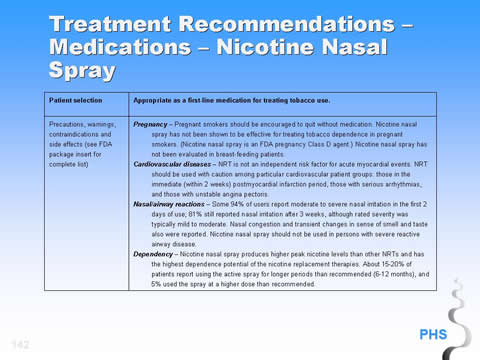Treatment Recommendations: Medications-Nicotine Nasal Spray

| Patient selection |
Appropriate as a first-line medication for treating tobacco use |
Precautions, warnings, contraindications and side effects (see FDA package insert for complete list) |
Pregnancy-Pregnant smokers should be encouraged to quit without medication. Nicotine nasal spray has not been shown to be effective for treating tobacco dependence in pregnant smokers. (Nicotine nasal spray is an FDA pregnancy Class D agent.) Nicotine nasal spray has not been evaluated in breast-feeding patients.
Cardiovascular diseases-NRT is not an independent risk factor for acute myocardial events. NRT should be used with caution among particular cardiovascular patient groups: those in the immediate (within 2 weeks) postmyocardial infarction period, those with serious arrhythmias, and those with unstable angina pectoris.
Nasal/airway reactions-Some 94% of users report moderate to severe nasal irritation in the first 2 days of use; 81% still reported nasal irritation after 3 weeks, although rated severity was typically mild to moderate. Nasal congestion and transient changes in sense of smell and taste also were reported. Nicotine nasal spray should not be used in persons with severe reactive airway disease.
Dependency-Nicotine nasal spray produces higher peak nicotine levels than other NRTs and has the highest dependence potential of the nicotine replacement therapies. About 15-20% of patients report using the active spray for longer periods than recommended (6-12 months), and 5% used the spray at a higher dose than recommended.
. |
 Previous Slide Contents Next Slide
Previous Slide Contents Next Slide 


